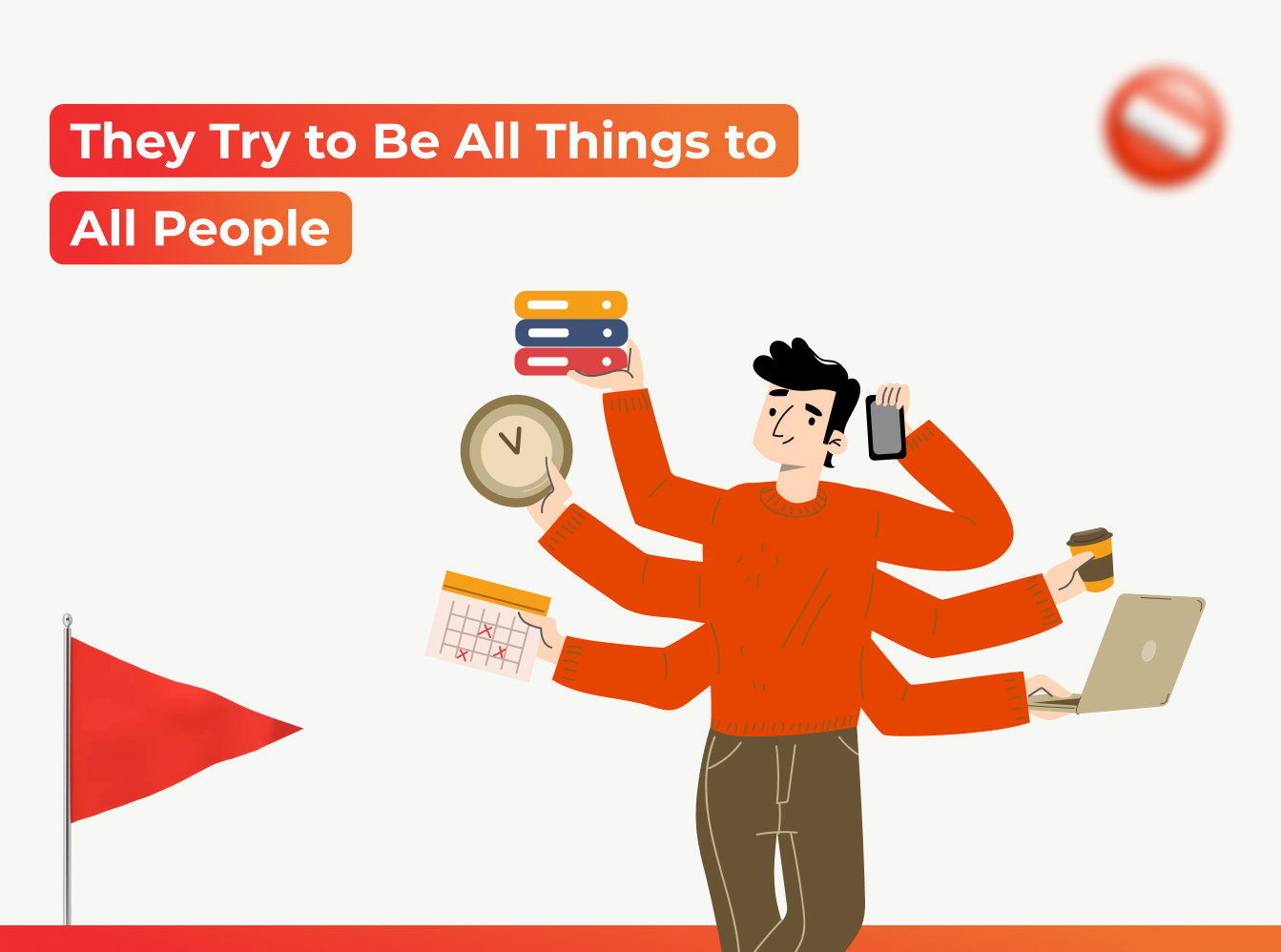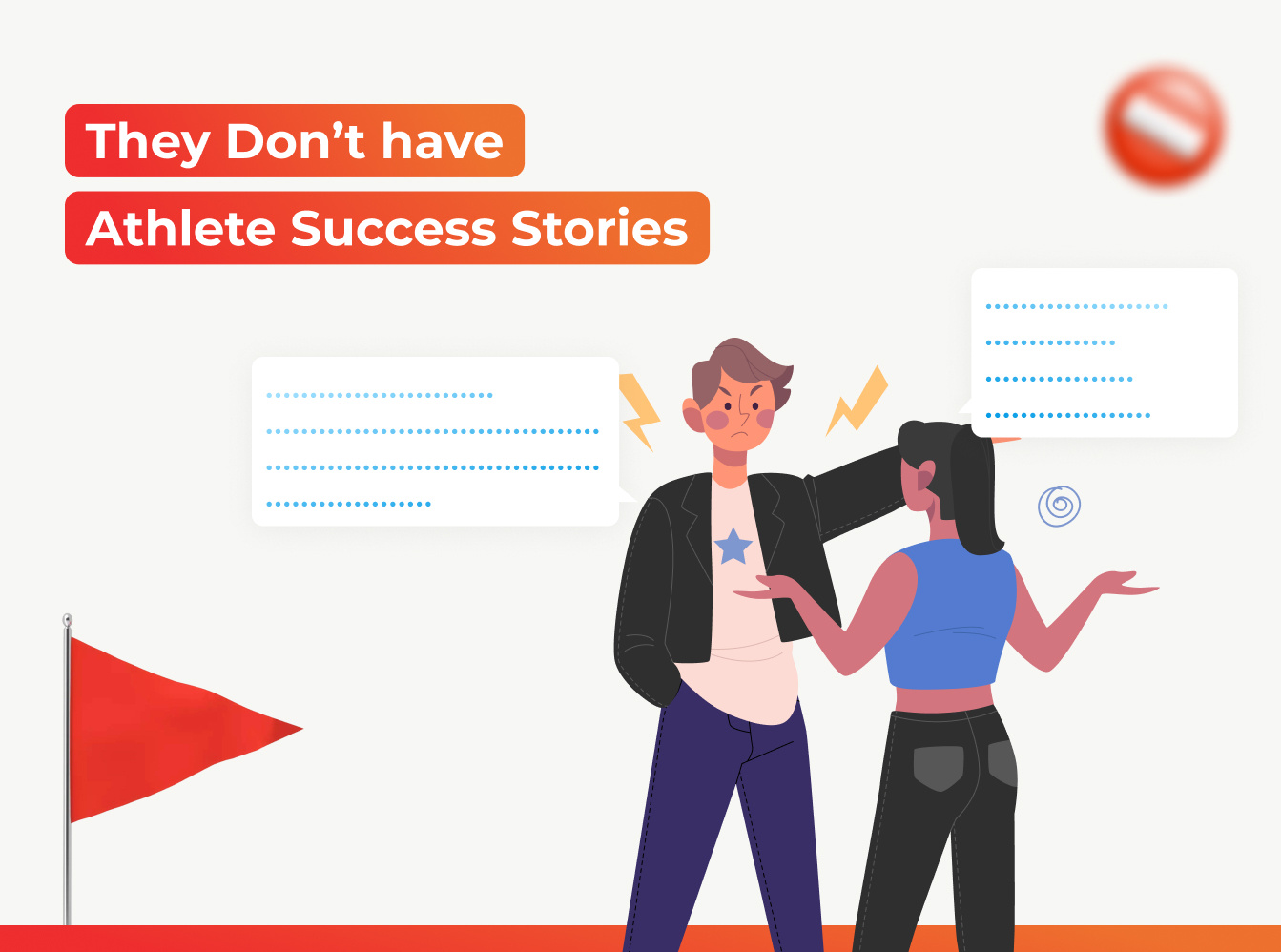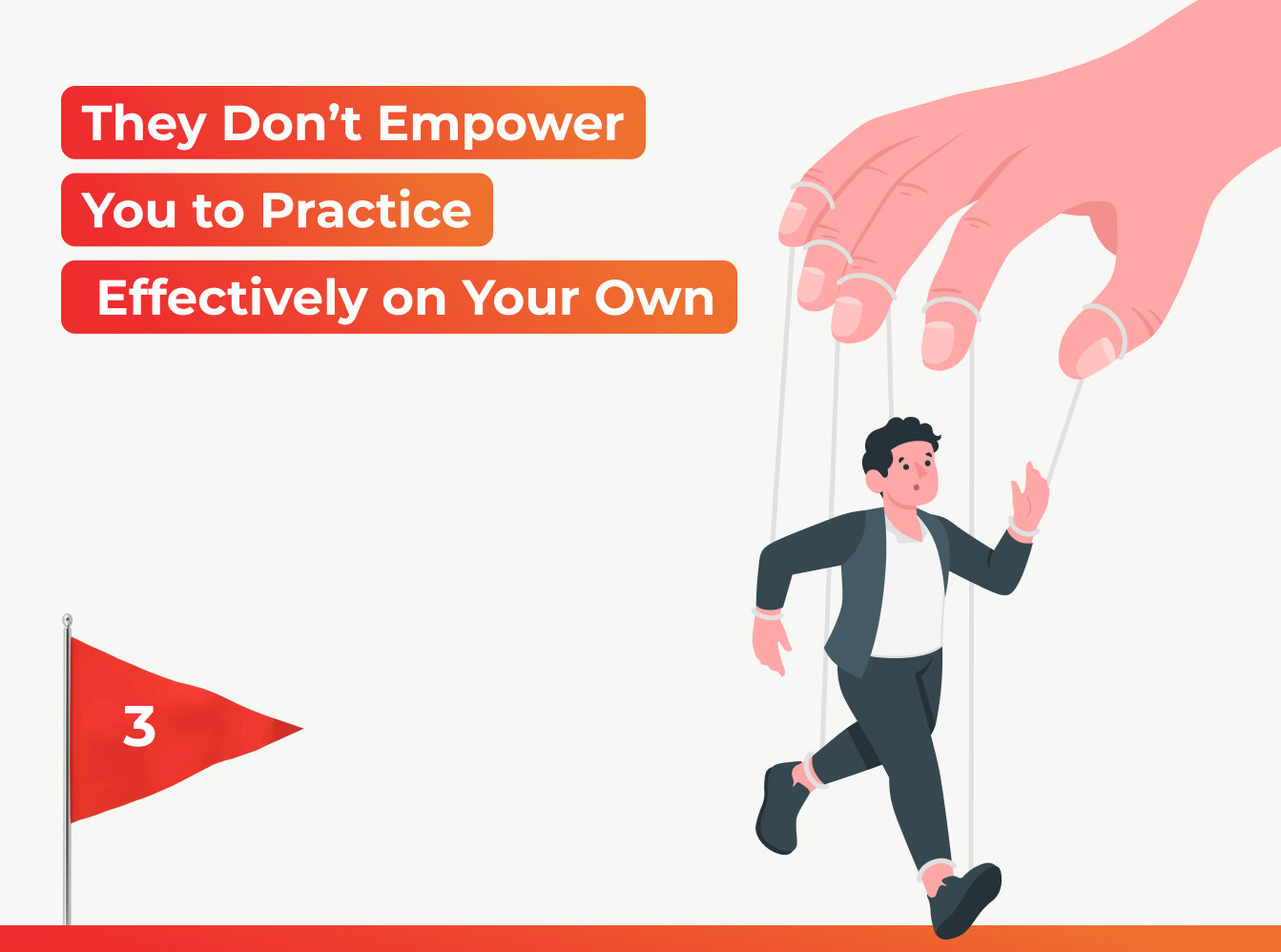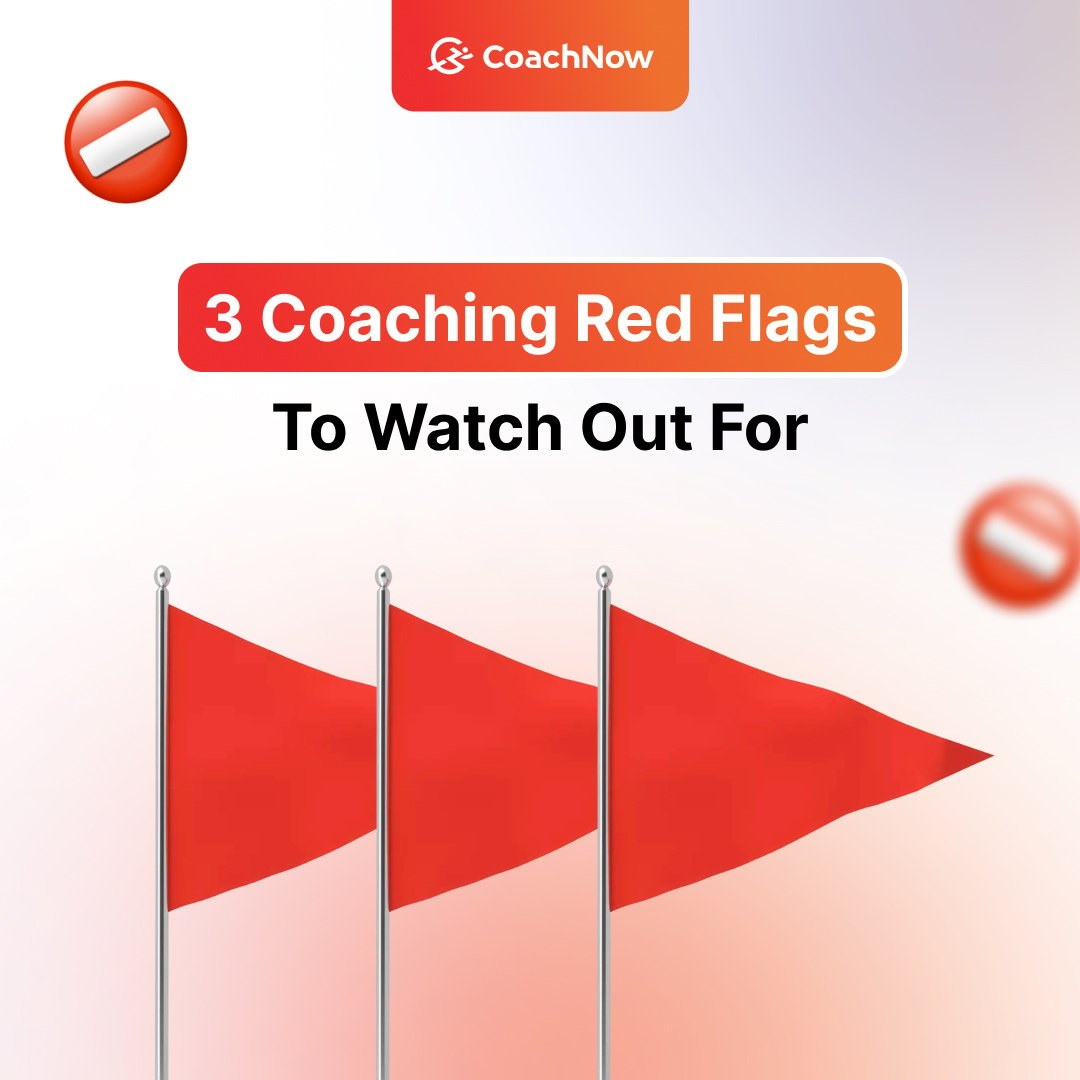Last week I discussed the 3 main things you should look for in a coach.
From leveraging technology, to embracing collaboration, and valuing your network, there are so many different things that come together to make a great coach.
But as I’m sure you know, Coaches aren’t one-size-fits-all.
Nobody is 100% perfect. Every coach has strengths, as well as areas that another coach does way better.
But, in my decades of experience in the coaching industry, I can tell you one thing: there are things that should be seen as a “red flag”. I.e. Something that you should notice and ask about before committing fully to their programs.
And don't get me wrong - if you notice some of these qualities in a potential coach, it shouldn’t necessarily be a deal breaker. I’d just advise that, all else equal, you avoid coaches that do these 3 things.
Let’s jump in.
From leveraging technology, to embracing collaboration, and valuing your network, there are so many different things that come together to make a great coach.
But as I’m sure you know, Coaches aren’t one-size-fits-all.
Nobody is 100% perfect. Every coach has strengths, as well as areas that another coach does way better.
But, in my decades of experience in the coaching industry, I can tell you one thing: there are things that should be seen as a “red flag”. I.e. Something that you should notice and ask about before committing fully to their programs.
And don't get me wrong - if you notice some of these qualities in a potential coach, it shouldn’t necessarily be a deal breaker. I’d just advise that, all else equal, you avoid coaches that do these 3 things.
Let’s jump in.

They Try to Be All Things to All People
If a coach wants to be all things to all people, they end up being nothing to nobody.
Full stop.
You should seek out a specialist rather than a generalist. Choose one area of your game that you want to improve and focus on that with an expert.
By doing so, you’re guaranteed to get a more detailed, in-depth approach to your practice, which is obviously way more beneficial to your development.
Obviously, every coach brings different strengths to the table, whether that be increasing your speed, improving your throw, etc. So naturally, it makes sense to have a different coach for each specific aspect of your training.
On the other hand, if the coach you’re speaking to says, “I can help you with your nutrition, fitness, mental, technical…”, that’s probably a coach you want to steer clear of.
The truth is no one is the best at everything. And a coach’s number 1 goal should be to help you become your best.
In that pursuit, recognize what aspects of training they’re best able to help you with, and where they need to pass the torch to someone else.
Full stop.
You should seek out a specialist rather than a generalist. Choose one area of your game that you want to improve and focus on that with an expert.
By doing so, you’re guaranteed to get a more detailed, in-depth approach to your practice, which is obviously way more beneficial to your development.
Obviously, every coach brings different strengths to the table, whether that be increasing your speed, improving your throw, etc. So naturally, it makes sense to have a different coach for each specific aspect of your training.
On the other hand, if the coach you’re speaking to says, “I can help you with your nutrition, fitness, mental, technical…”, that’s probably a coach you want to steer clear of.
The truth is no one is the best at everything. And a coach’s number 1 goal should be to help you become your best.
In that pursuit, recognize what aspects of training they’re best able to help you with, and where they need to pass the torch to someone else.

They Don’t have Athlete Success Stories
If you’re trying to select an academy or college program, and the coach doesn’t have examples of how other athletes in their program have performed, you’ve stumbled upon another red flag.
As a coach, I believe that if you’re going to spend a ton of money and go to a university where you’re putting your whole life on the line, you should be able to interview some of their other athletes and talk to their other clients.
If a coach isn’t willing to let you chat and ask questions to their existing or past clientele, that’s a big area of concern in my book.
Doing so will help you understand how this coach works with other athletes and whether or not their style will work for you.
When I played in college, one of the biggest mistakes I made was not interviewing people that had formerly been in the program. When I met them later, many of them told me they regret choosing that program and would have warned newcomers to steer clear.
Obviously, this would’ve been hugely beneficial for me to know ahead of deciding to play there.
I’ve actually passed this advice to a lot of kids and their parents.
Many have appreciated the experience, regardless of the result. I.e. When they hear past clients gush about the coach, they feel extra validated by bringing them on; when past clients hesitate their recommendation, they feel they dodged a bullet.
In the end, it can’t hurt to ask. In my experience, the best coaches are more than willing to share their references.
As a coach, I believe that if you’re going to spend a ton of money and go to a university where you’re putting your whole life on the line, you should be able to interview some of their other athletes and talk to their other clients.
If a coach isn’t willing to let you chat and ask questions to their existing or past clientele, that’s a big area of concern in my book.
Doing so will help you understand how this coach works with other athletes and whether or not their style will work for you.
When I played in college, one of the biggest mistakes I made was not interviewing people that had formerly been in the program. When I met them later, many of them told me they regret choosing that program and would have warned newcomers to steer clear.
Obviously, this would’ve been hugely beneficial for me to know ahead of deciding to play there.
I’ve actually passed this advice to a lot of kids and their parents.
Many have appreciated the experience, regardless of the result. I.e. When they hear past clients gush about the coach, they feel extra validated by bringing them on; when past clients hesitate their recommendation, they feel they dodged a bullet.
In the end, it can’t hurt to ask. In my experience, the best coaches are more than willing to share their references.

They Don’t Empower You to Practice Effectively on Your Own
Obviously, the coaching that takes place during your sessions is hugely important to your development. But equally important is the practice you do, by yourself, in your own time.
Finding a coach who supports you in-person and from afar, and who provides you with the right tools to practice on your own will be a game changer for you.
I’ve said before that what distinguishes a good coach from a great coach is “ how autonomous they empower their athletes to be.”
Retention of information can be a struggle for many athletes. So with that in mind, ask yourself the following question when meeting a new coach:
Do they encourage you to set intentions, plan, and reflect on your performance?
Your coach should help you develop these critical skills. Mastering them will help you succeed both athletically and in your personal life.
When a coach supports their athletes to be autonomous and work on retaining their advice, the athlete learns the skill at hand and how to better retain information from their future training sessions.
A related note: technology is the #1 way your coach can empower you to practice on your own. In fact, CoachNow was designed to help you stay autonomous and ensure that your practice is as efficient as possible.
From training journals to an online Cloud Library full of training videos, coaching voiceovers, and other helpful resources, coaches can interact with the training content that you upload.
When they utilize the right technology, both the coach and athlete maximize their time and effort, progressing further and faster than before.
Finding a coach who supports you in-person and from afar, and who provides you with the right tools to practice on your own will be a game changer for you.
I’ve said before that what distinguishes a good coach from a great coach is “ how autonomous they empower their athletes to be.”
Retention of information can be a struggle for many athletes. So with that in mind, ask yourself the following question when meeting a new coach:
Do they encourage you to set intentions, plan, and reflect on your performance?
Your coach should help you develop these critical skills. Mastering them will help you succeed both athletically and in your personal life.
When a coach supports their athletes to be autonomous and work on retaining their advice, the athlete learns the skill at hand and how to better retain information from their future training sessions.
A related note: technology is the #1 way your coach can empower you to practice on your own. In fact, CoachNow was designed to help you stay autonomous and ensure that your practice is as efficient as possible.
From training journals to an online Cloud Library full of training videos, coaching voiceovers, and other helpful resources, coaches can interact with the training content that you upload.
When they utilize the right technology, both the coach and athlete maximize their time and effort, progressing further and faster than before.
Throughout my coaching career, I’ve seen red flags come in all shapes and sizes, and I don’t say that to scare you.
Rather, I want you to be aware of some common red flags so you know what to look out for (both good and bad) when choosing the best coach for you.
Since “the right coach” looks so different for everybody, you have to identify what qualities are most important for you to find, and avoid.
But if you’re unsure of where to begin, these 3 red flags are a solid place to start.
Rather, I want you to be aware of some common red flags so you know what to look out for (both good and bad) when choosing the best coach for you.
Since “the right coach” looks so different for everybody, you have to identify what qualities are most important for you to find, and avoid.
But if you’re unsure of where to begin, these 3 red flags are a solid place to start.
